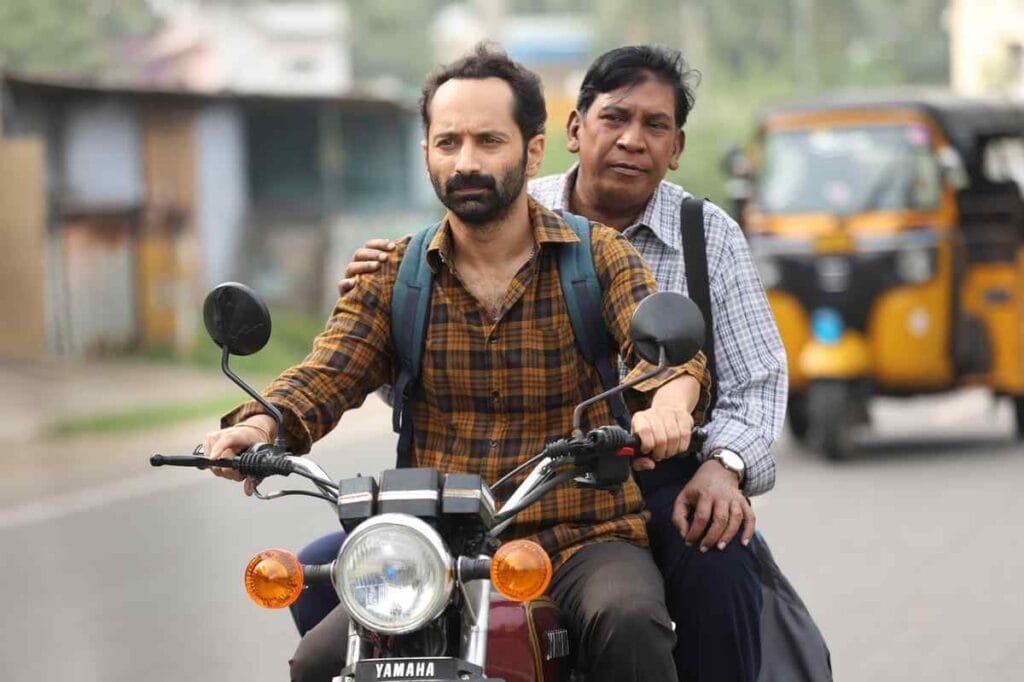
Tamil/2h30m/2025
Synopsis: Dhaya’s ambition of becoming a full-scale thief intensifies when he meets an old man, Velayudham Pillai, who has a significant sum in his bank account. The fact that he also has Alzheimer’s leads Dhaya to think that stealing the old man’s money would be a cakewalk, but it only complicates matters further. Will Dhaya change his mind along his road trip with the poor old soul?
Review:
‘Cross-genre’ is an idea of combining two or more different genres to make the narration more interesting. It gives a unique tone to the narration that would easily keep the audience hooked—when the genre shifts suddenly, we see the same characters and the storyline operating in an entirely different setup. This abstract idea is quite popular in the world of filmmaking, yet it remains one of the least explored.
Cross-genre isn’t everyone’s cup of tea, as it is quite difficult to fuse elements while also maintaining a constant tempo and retaining the film’s core idea. Yet, film-makers like Bong Joo Ho have managed to use it effectively—if cross-genre is an art, then he must be the Picasso of it! Guess, Sudheesh Shankar has also wished to join this ‘Picasso’ list through his recent work, Maareesan, but sadly, it has only turned out to be a huge blunder.
The idea feels great on paper, but it is terrible to watch on the big screen. Some parts of the film work well, while its take on child abuse isn’t just clichéd but expresses mere carelessness. We’ll get there shortly in this review, but first, let us look at some magical aspects of Maareesan.
(When the film makes sense)
As soon as we saw the trailer of this film, we were intrigued simply because of the duo—Vadivelu and Fahad Fazil. We previously saw them in Mari Selvaraj’s Mamannan, but in an entirely different shade. Ever since then, we’ve wanted to see them together again, and now our dreams have finally come true. Both have delivered great performances, and their screen presence is impeccable.
It all starts when Dhaya (Fahad Fazil) returns from jail and does all the quirky things in no time. He is mischievous and is completely carefree. He always has a reason to justify his tendency to steal. But when we think about Dhaya’s intention behind his stealth operation after meeting Velayudham Pillai (Vadivelu), our sympathy shifts towards the old man.
We learn that Velayudham Pillai (Vadivelu) suffers from Alzheimer’s and dislikes being at home, using Dhaya to cope with his condition. Both exploit the situation for their own agenda. They start their journey on a stolen two-wheeler in search of Velayudham’s daughter, believed to be in Palakkad. Though this journey feels long, we enjoy watching them bond along with Vadivelu’s trademark counters.
(when Mareesan becomes exhausting)
But soon, our connection to the film is shaken when the genre shifts from a road drama to a crime thriller. It feels completely unnecessary and forced. It is let down by poorly written ideas and lacks proper direction. What’s worse is that it carelessly deals with the subject (child sxx abuse), which has to be handled with utmost care. It desensitises the issue by deriving a solution that everything could be resolved through ‘male violence’, without addressing socio-political aspects and the victim’s psyche.
For instance, Arun Kumar’s ‘Chithha’, which came out a couple of years back, dealt with the same subject. There was a particular scene in the film which addressed men’s saviour complex, like when Nimisha (Sakthi) recalls the abuse she faced in her childhood, Sidhdharth (Chithha) immediately expresses a desire to resort to violence and punish the abuser. Sakthi quickly retaliates, saying: You didn’t stop to think about how it impacted me or how I’ve healed; all you can think about is avenging the abuser. She also tells him the abuser is already dead. This scene managed to highlight the impulsiveness of men and the futility of their so-called solutions. Mareesan, on the other hand, fails to explore any of these aspects and seems to use a sensitive subject merely for emotional shock—it doesn’t feel like a responsible attempt.
The Final Verdict?
Guess the director (Sudheesh Shankar) didn’t just want to be the ‘Picasso’ of cross genres, but also a ‘wannabe’ progressive—he has barely passed the test. Watching Maareesan feels like witnessing two different films—one well-made, the other painfully awful.